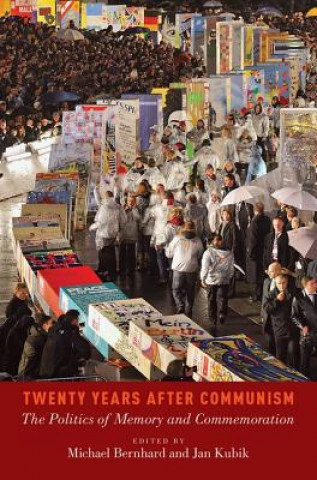
Doručenie
Nákupný poradca





Nehodí sa? Žiadny problém! U nás môžete do 30 dní vrátiť
 Darčekový poukaz
v ľubovoľnej hodnote
Darčekový poukaz
v ľubovoľnej hodnote
S darčekovým poukazom nešliapnete vedľa. Obdarovaný si za darčekový poukaz môže vybrať čokoľvek z našej ponuky.
Twenty Years After Communism
 Angličtina
Angličtina
 544 b
544 b
30 dní na vrátenie tovaru
Mohlo by vás tiež zaujímať


While the fall of the Berlin Wall is positively commemorated in the West, the intervening years have shown that the former Soviet Bloc has a more complicated view of its legacy. In post-communist Eastern Europe, the way people remember state socialism is closely intertwined with the manner in which they envision historical justice. Twenty Years After Communism is concerned with the explosion of a politics of memory triggered by the fall of state socialism in Eastern Europe, and it takes a comparative look at the ways that communism and its demise have been commemorated (or not commemorated) by major political actors across the region. The book is built on three premises. The first is that political actors always strive to come to terms with the history of their communities in order to generate a sense of order in their personal and collective lives. Second, new leaders sometimes find it advantageous to mete out justice on the politicians of abolished regimes, and whether and how they do so depends heavily on their interpretation and assessment of the collective past. Finally, remembering the past, particularly collectively, is always a political process, thus the politics of memory and commemoration needs to be studied as an integral part of the establishment of new collective identities and new principles of political legitimacy. Each chapter takes a detailed look at the commemorative ceremony of a different country of the former Soviet Bloc. Collectively the book looks at patterns of extrication from state socialism, patterns of ethnic and class conflict, the strategies of communist successor parties, and the cultural traditions of a given country that influence the way official collective memory is constructed. Twenty Years After Communism develops a new analytical and explanatory framework that helps readers to understand the utility of historical memory as an important and understudied part of democratization.
Informácie o knihe
 Angličtina
Angličtina
Kategórie




 Ako nakupovať
Ako nakupovať




































